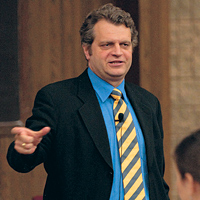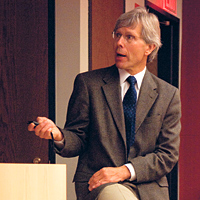Don't panic — crisis management a Kellogg expertise
When things go wrong, companies must rebuild their reputation and earn back customer trust. Kellogg faculty offer strategic insights to succeed
By Rebecca Lindell
Tainted milk in China. Toys with lead paint. Stock-market volatility.
If there were ever a time to study crisis management, it's now.
Fortunately, the Kellogg School has remained ahead of the curve, producing research and strategies that let companies react successfully when confronted by the unexpected.
Daniel Diermeier, the IBM Professor of Regulation and Competitive Practice, has been at the forefront of these efforts over the past decade. He says it is more important than ever for companies to respond to crises swiftly — and wisely.
"More and more business models require a high degree of customer intimacy to be successful," Diermeier says. "You are no longer selling a product; you're selling an experience. This allows you to connect more deeply with your customers, which is good. But when you build a business on trust and that trust is violated, you have a very complex problem to solve."
 |
|
| Professor Daniel Diermeier has helped turn Kellogg into a crisis management leader. |
|
| |
|
The global nature of the supply chain, and the increased scrutiny made possible by the Internet, leaves even the best-prepared company vulnerable to crises, Diermeier adds.
"There may be an issue with a part made in China, but if I'm using those materials, I have to respond because I am the one dealing with the customer," Diermeier says. "Companies are making more promises and losing control over whether they can keep them."
Diermeier has worked closely with other Kellogg faculty members, including Timothy Feddersen, the Wendell Hobbs Professor of Managerial Economics and Decision Sciences, and David Austen-Smith, the Peter G. Peterson Professor of Corporate Ethics, on crisis-management research. He also consults with various companies on crisis response, calling this fieldwork "a wonderful synergy" with his research and teaching.
"The research started because we didn't have the answers students were asking for," he recalls. "We had our instruction and our case studies, but that didn't meet our students' needs. Every one of our research projects has been driven by the questions our students were raising. They had very specific and challenging questions, and we wanted to find the answers."
Those questions focus on how companies should respond to a crisis, whether the challenge is reputational, regulatory or political. How does a company protect its brand? How does a company's response convey or contradict its values?
The search for answers has been supported by the school's Ford Motor Co. Center for Global Citizenship, which Diermeier directs. Through the center, he is investigating the value of corporate social responsibility and the impact it can have on a company's brand, competitiveness and profitability. Using artificial intelligence and software tools, he has created a "reputational index" for media coverage to help determine whether social responsibility strategies correlate with increased sales figures or stock prices.
| |
 |
| |
An expert in political theory, Professor David Austen-Smith teaches courses on values-based leadership and decision-making during crises. |
| |
|
Another recent study assessed the value of "owning up" to a crisis, versus the typical "no comment" response many companies employ. The company is in a predicament: "Should I talk to the press or not?" Diermeier says. "If I do talk to the press, I face increased legal liability. But if I don't, I may lose the trust of my customers. It's a very tricky position to be in, because companies have to make these calls in a matter of minutes or hours."
Diermeier has sought to understand the psychology of customers when confronted by these corporate responses, and to create a framework companies can use to act. Among his discoveries: when companies take the "no comment" route, they are perceived the same as if they adopt a defensive posture.
"The default position of the company is actually negative," Diermeier says. "They're paying a significant price in the minds of the consumer, and this spills over into how their products are viewed."
For example, subjects in one Diermeier study were told that a bottled water producer was facing sexual harassment charges. They were then asked to judge the taste of the company's product.
"The water didn't taste as good to them, and they drank less," Diermeier says. "The lesson is, when you don't address these charges effectively, it affects the way your company and your product are perceived."
Companies, in fact, can be viewed much like members of the community, particularly when it comes to crises, Diermeier says. Firms are expected to be "good Samaritans" in the wake of disasters like hurricanes, and those that do not are evaluated negatively.
"What are the traits of a good Samaritan? He cares and knows what to do," Diermeier says. "It doesn't matter what industry you're in, whether you're an oil company or a water company when you hand out blankets. But you need to be handing out blankets, in a competent and caring manner."
Next: Kellogg health marketing book aimed at academics, practitioners |



